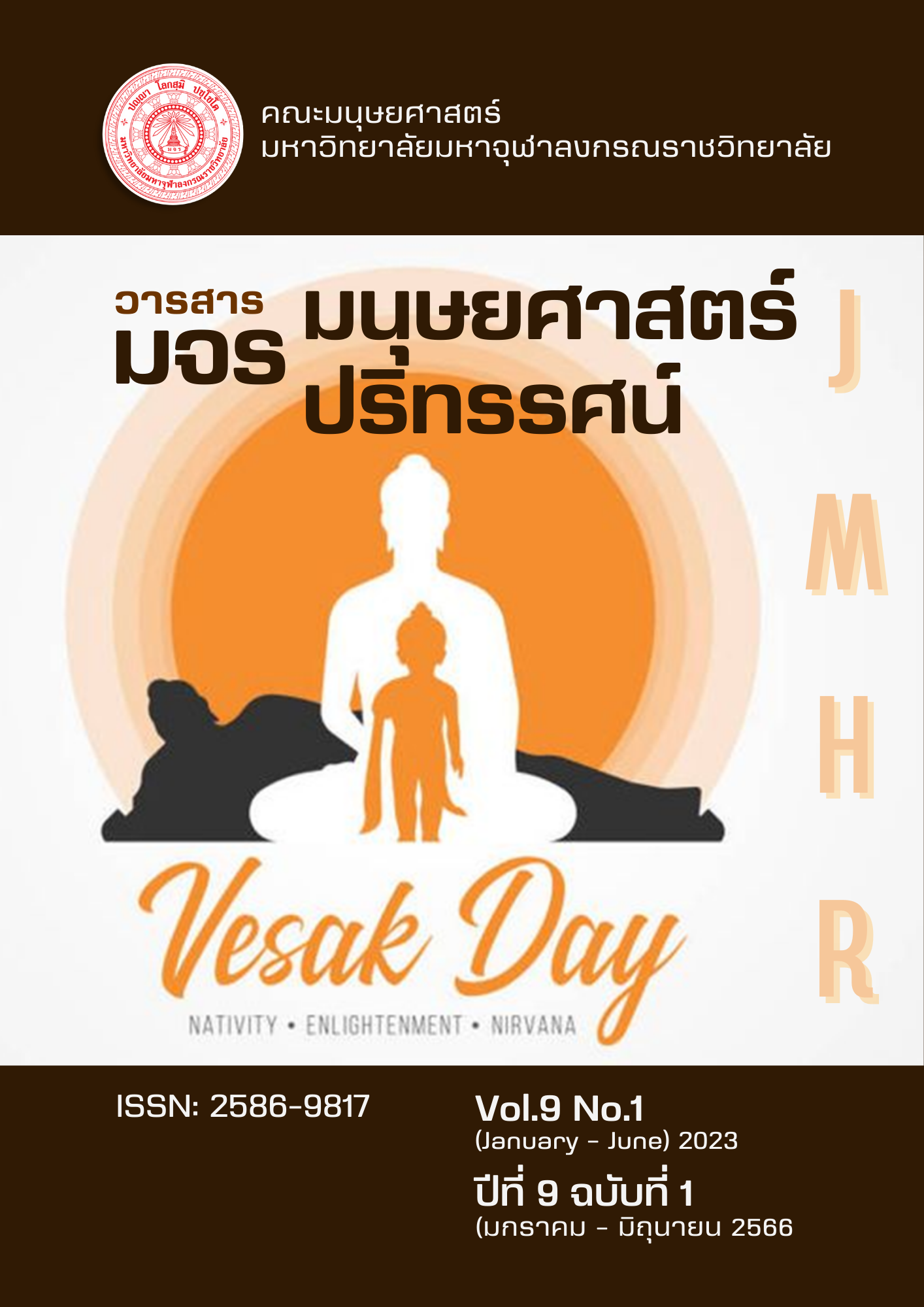การบริหารงานกิจการนักเรียนตามแนวโรงเรียนวิถีพุทธที่ส่งผลต่อพฤติกรรมจิตสาธารณะของนักเรียนในสถานศึกษา สังกัดสำนักงานเขตพื้นที่การศึกษามัธยมศึกษาพัทลุง
คำสำคัญ:
การบริหารงาน, กิจการนักเรียน, , โรงเรียนวิถีพุทธ, พฤติกรรม, จิตสาธารณะบทคัดย่อ
การวิจัยครั้งนี้ใช้ระเบียบวิจัยแบบผสานวิธี มีวัตถุประสงค์ 1. เพื่อศึกษาการบริหารงานกิจการนักเรียนตามแนวโรงเรียนวิถีพุทธและพฤติกรรมจิตสาธารณะของนักเรียน 2. เพื่อศึกษาการบริหารงานกิจการนักเรียนตามแนวโรงเรียนวิถีพุทธที่ส่งผลต่อพฤติกรรมจิตสาธารณะของนักเรียน และ 3. เพื่อศึกษาแนวทางการพัฒนาการบริหารงานกิจการนักเรียนตามแนวโรงเรียนวิถีพุทธที่ส่งผลต่อพฤติกรรมจิตสาธารณะของนักเรียนในสถานศึกษาสังกัดสำนักงานเขตพื้นที่การศึกษามัธยมศึกษาพัทลุง เก็บรวบรวมข้อมูลเชิงปริมาณโดยแบบสอบถามโดยศึกษาจากกลุ่มตัวอย่าง คือ ผู้บริหารสถานศึกษาและครูผู้สอนในโรงเรียนวิถีพุทธ สังกัดสำนักงานเขตพื้นที่การศึกษามัธยมศึกษาพัทลุงปีการศึกษา 2564 ได้มาโดยกลุ่มตัวอย่างจากตารางความสัมพันธ์ระหว่างประชากรและกลุ่มตัวอย่างของเครจซี่และมอร์แกนจำนวน 234 คน กำหนดกลุ่มตัวอย่างตามสัดส่วนของประชากรในแต่ละสหวิทยาเขต โดยการสุ่มแบบอย่างง่าย ด้วยวิธีการจับสลาก ตามจำนวนกลุ่มตัวอย่างของแต่ละสหวิทยาเขต สถิติที่ใช้ ได้แก่ ค่าความถี่ ค่าร้อยละ ค่าเฉลี่ย ส่วนเบี่ยงเบนมาตรฐานและค่าสัมประสิทธิ์สหสัมพันธ์ โดยใช้โปรแกรมสำเร็จรูปเชิงคุณภาพโดยการสัมภาษณ์ผู้ให้ข้อมูลสำคัญ จำนวน 5 คน
ผลการวิจัยพบว่า
- การบริหารงานกิจการนักเรียนตามแนวโรงเรียนวิถีพุทธ โดยภาพรวมอยู่ในระดับมาก เมื่อพิจารณารายด้านพบว่าอยู่ในระดับมากทุกด้าน
- การบริหารงานกิจการนักเรียนตามแนวโรงเรียนวิถีพุทธที่ส่งผลต่อพฤติกรรมจิตสาธารณะของนักเรียน 4 ด้าน คือ ด้านการบริหารกิจการนักเรียน ด้านการส่งเสริมพัฒนาให้นักเรียนมีวินัย คุณธรรม จริยธรรม ด้านการดำเนินการส่งเสริมประชาธิปไตยในโรงเรียน และด้านการประเมินผลการดำเนินงานกิจการนักเรียน ส่งผลต่อส่งผลต่อพฤติกรรมจิตสาธารณะของนักเรียนในทางบวกอย่างมีนัยสำคัญทางสถิติที่ระดับ 0.05
- แนวทางการพัฒนาการบริหารงานกิจการนักเรียนตามแนวโรงเรียนวิถีพุทธที่ส่งผลต่อพฤติกรรมจิตสาธารณะของนักเรียน พบว่า โรงเรียนจะต้องมีการแต่งตั้งคณะกรรมการระดมความคิดรับฟังความคิดเห็นของผู้มีส่วนได้ส่วนเสีย มีการวางแผนกิจกรรมที่สอดคล้องแนวทางดำเนินการของโรงเรียนวิถีพุทธและตอบโจทย์คุณธรรมอัตลักษณ์ของโรงเรียน มีการกำหนดนโยบาย ขอบข่ายงาน มีการนำนวัตกรรมมาขับเคลื่อนงาน จัดกิจกรรมส่งเสริมพัฒนาความประพฤติและระเบียบวินัย คุณธรรม จริยธรรม มีนวัตกรรมเพื่อการขับเคลื่อนงานระบบดูแลช่วยเหลือนักเรียน มีการจัดทำแผนงาน/โครงการส่งเสริมประชาธิปไตยในโรงเรียนที่สอดคล้องกับแนวทางดำเนินการโรงเรียนวิถีพุทธและมีการนิเทศกำกับติดตามการดำเนินงานกิจการนักเรียน
เอกสารอ้างอิง
กัณฑ์จรี แสวงการ. (2561). การศึกษากิจกรรมและจิตลักษณะที่ส่งผลต่อจิตสาธารณของนักศึกษามหาวิทยาลัยราชภัฏ เขตภาคใต้ตอนบน. วารสารนาคบุตรปริทรรศน์ มหาวิทยาลัยราชภัฏนครศรีธรรมราช, 10(ฉบับพิเศษ), 87-90.
ดวงดาว พรีพรม. (2558). จิตสาธารณะของนักเรียนชั้นมัธยมศึกษาปีที่ 3 สังกัดสํานักงานเขตพื้นที่การศึกษาประถมศึกษานครราชสีมา เขต 6 (วิทยานิพนธ์ปริญญาครุศาสตรมหาบัณฑิต). มหาวิทยาลัยราชภัฏนครราชศรีมา : นครราชศรีมา.
นาตยา เลียบจันทร์. (2562). การศึกษาการบริหารกิจการนักเรียนอาชีวศึกษาตามหลักไตรสิกขาจังหวัดสมุทรปราการอาชีวศึกษาภาคกลาง เขต 3 (วิทยานิพนธ์ปริญญาครุศาสตรมหาบัณฑิต). มหาวิทยาลัยมหาจุฬาลงกรณราชวิทยาลัย : พระนครศรีอยุธยา.
นงเยาว์ กัลยาลักษณ์. (2541). การศึกษาปัญหาการดําเนินงานฝ่ายกิจการนักเรียนนักศึกษาของวิทยาลัยอาชีวศึกษาในภาคตะวันออกเฉียงเหนือ (วิทยานิพนธ์ปริญญาการศึกษามหาบัณฑิต). มหาวิทยาลัยมหาสารคาม : มหาสารคาม.
ภูมิพิพัฒน์ รักพรมงคล. (2558). ปัจจัยเชิงสาเหตุที่ส่งผลต่อพฤติกรรมจิตสาธารณะของนักเรียนมัธยมศึกษาสังกัดสํานักงานคณะกรรมการการศึกษาขั้นพื้นฐาน. วารสารการบริหารการศึกษามหาวิทยาลัยบูรพา, 9(2), 81-86.
มหาวิทยาลัยจุฬาลงกรณ์ราชวิทยาลัย. (2557). โรงเรียนวิถีพุทธ. กรุงเทพฯ : มหาจุฬาลงกรณราชวิทยาลัย.
วารุณี วงศ์วิรุฬรักษ์. (2554). การวิจัยเชิงปฏิบัติการแบบมีส่วนร่วมเพื่อพัฒนาจิตสาธารณะของนักเรียนโรงเรียนบ้านสามขา สํานักงานเขตพื้นที่การศึกษาประถมศึกษามุกดาหาร (วิทยานิพนธ์ปริญญาครุศาสตรมหาบัณฑิต). มหาวิทยาลัยราชภัฏสกลนคร : สกลนคร.
วีรนุช สุทธพันธ์. (2558). รูปแบบการบริหารจัดการโรงเรียนวิถีพุทธที่มุ่งเน้นจิตอาสาของนักเรียนประถมศึกษา. วารสารวิชาการมหาวิทยาลัยอีสเทิร์นเอเชีย ฉบับสังคมศาสตร์และมนุษยศาสตร์, 5(2), 116-118.
ศตวรรษ กฤษณา และคณะ. (2564). การบริหารงานกิจการนักเรียนตามหลักสังคหวัตถุ 4 ในโรงเรียนมัธยมศึกษาอำเภอมหาชนะชัยจังหวัดยโสธร สังกัดสำนักงานเขตพื้นที่การศึกษามัธยมศึกษา เขต 28. วารสารการบริหารการศึกษา มมร. วิทยาเขตร้อยเอ็ด, 1(1), 29-33.
ศิริกมล นนทะภา. (2560). แนวทางการพัฒนาคุณลักษณะด้านจิตสาธารณะ นักเรียนชั้นประถมศึกษาปีที่ 4 – 6 สังกัดสำนักงานเขตพื้นที่การศึกษาประถมศึกษามหาสารคาม เขต 1 (วิทยานิพนธ์ปริญญาครุศาสตรมหาบัณฑิต). มหาวิทยาลัยราชภัฏมหาสารคาม : มหาสารคาม.
สำนักงานคณะกรรมการพัฒนาการเศรษฐกิจและสังคมแห่งชาติ สำนักนายกรัฐมนตรี. (2560). แผนพัฒนาเศรษฐกิจและสังคมแห่งชาติ ฉบับที่สิบสอง พ.ศ. 2560 – 2564. กรุงเทพฯ : สำนักงานคณะกรรมการพัฒนาการเศรษฐกิจและสังคมแห่งชาติ.
อาทิตยา เวชกรณ์. (2559). แนวทางการบริหารงานกิจการนักเรียนของสถานศึกษาขั้นพื้นฐานสังกัดสำนักงานคณะกรรมการส่งเสริมการศึกษาเอกชนในจังหวัดนครสวรรค (วิทยานิพนธ์ปริญญาครุศาสตรมหาบัณฑิต). มหาวิทยาลัยราชภัฏนครสวรรค์ : นครสวรรค์.
ดาวน์โหลด
เผยแพร่แล้ว
รูปแบบการอ้างอิง
ฉบับ
ประเภทบทความ
หมวดหมู่
สัญญาอนุญาต
ลิขสิทธิ์ (c) 2023 วารสาร มจร มนุษยศาสตร์ปริทรรศน์

อนุญาตภายใต้เงื่อนไข Creative Commons Attribution-NonCommercial-NoDerivatives 4.0 International License.






